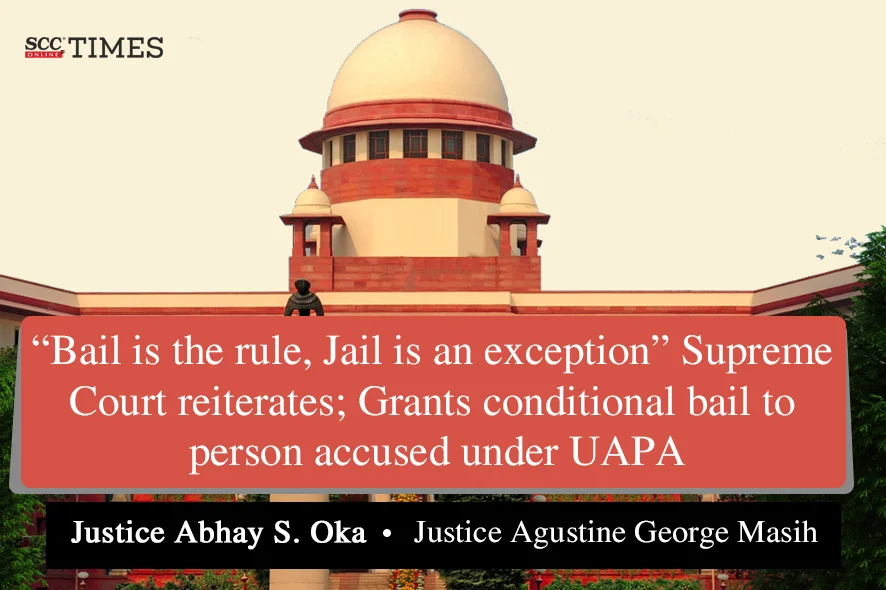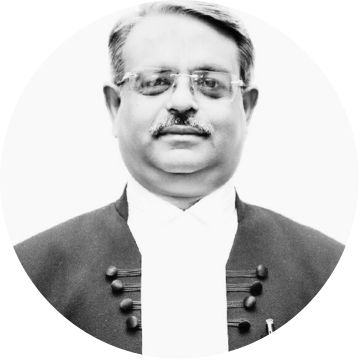Supreme Court: In the instant matter wherein, the appellant who was being prosecuted for offences punishable under provisions of Penal Code, 1860 and Sections 13, 18, 18-A and 20 of the Unlawful Activities (Prevention) Act, 1967 (UAPA); had applied for bail before the Patna High Court, which was rejected. The Division Bench of Abhay S. Oka* and Agustine George Masih, JJ., while hearing the instant appeal challenging the impugned judgment of Patna High Court, emphatically reiterated that when a case is made out for a grant of bail, the Courts should not have any hesitation in granting bail. “The allegations of the prosecution may be very serious, but the duty of the Courts is to consider the case for grant of bail in accordance with the law. “Bail is the rule, and jail is an exception” is a settled law”.
The Court also berated the National Investigation Agency (NIA) for distortions in chargesheet vis-a-vis attributing certain statements to the protected witness, which he did not make. “NIA owes an explanation for that. The investigating machinery has to be fair”.
Background: It was alleged that the 1st floor of a premise owned by the appellant’s wife, was being used for objectional activities of an organisation called Popular Front of India (PFI). The Police conducted a raid on 11-7-2022 and recovered several incriminating items and documents. Subsequently, the appellant was arrested on 12-7-2022.
Contentions: Counsels for the appellant submitted that there was no material to link the appellant with the offences under the UAPA. It was pointed out that it was alleged the appellant’s wife was the owner of a building known as Ahmad Palace and that the appellant had clandestinely shown the first floor of the premises and rented the same to the 1st accused.
The appellant’s counsel submitted that the chargesheet did not establish any connection between the activities of PFI and the appellant. Even prima facie material for connecting the appellant with PFI is not available.
It was further argued that the premises in question is also occupied by several people and there are pathologies, clinics and shops and that there are CCTVs fixed on the premises as well. Therefore, if the activities of PFI were being conducted in the building with the appellant’s connivance, he would not have fixed CCTV cameras inside the property. It was also argued that the appellant’s case satisfies the tests laid down by Section 43-D (5) of the UAPA, as there are no reasonable grounds for believing that the accusations against the appellant are prima facie true.
Per contra, counsels for the respondents highlighted the statements made by protected witnesses, namely V, Y and Z and CCTV footage of 6/7-7-2022, showing the appellant and 1st accused shifting several items from the first floor of Ahmad Palace. The respondents also submitted that the appellant attended a meeting-cum-training session the first floor and discussed topics related to expansion of PFI, training of members etc. It was submitted that protected witness Z stated that directions were issued to the trained PFI members to attack and kill the selected targets who were involved in making derogatory remarks against Islam.
The respondents also contended that the rent agreement between the appellant and 1st accused was bogus and there was enough material in the documents produced along with the charge sheet, which shows that strong prima-facie case about the appellant’s involvement in the offences punishable under Sections 13, 18, 18A and 20 of the UAPA. It was further pointed out pointed out that 1st accused had been an active member of a banned terrorist organisation, Student Islamic Movement of India (SIMI).
Court’s Assessment-
Assessment of the Chargesheet submitted
Perusing the facts and contentions raised by the parties, the Court examined the chargesheet in detail. The Court noted that statements made by the appellant and 1st accused vis-a-vis shifting of items from the first floor, did not contradict. The premises on the first floor of the building Ahmad Palace were let out to 1st accused at the rent of Rs. 16,000 per month and gave an advance of Rs. 32,000/- towards rent for two months. The Court noted that if an assumption is made that the appellant knew 1st accused’s association with PFI, the organisation however is not listed as a terrorist organisation within the meaning of Section 2(m) of UAPA.
Furthermore, the Court observed that the charge sheet did not contain any material to show any connection of the appellant with PFI before letting out first floor premises to 1st accused.
Perusing the chargesheet, the Court pointed out that in the raid conducted on 11-7-2022, certain documents were recovered, however no recovery has been shown from the appellant in the chargesheet.
The Court significantly noted that there was no mention in the charge sheet about the nature of the articles allegedly shifted earlier by the appellant from the first-floor. “If the appellant intended to shift incriminating material circulated by PFI, he would have shifted the material mentioned in paragraph 17.1 of the charge sheet”.
The Court further stated that if the appellant intended to allow the conduct of the objectionable activities of PFI by giving the first floor on rent, he would not have installed CCTV cameras in the premises.
The Court analysed the statement made by protected witness Z, as mentioned in Paragraph 17.16 of the chargesheet. Taking note of the translated version of the statement recorded before the Additional Chief Judicial Magistrate, Patna, which was produced in a sealed envelope; the Court found that the statement substantially differed from what was narrated in paragraph 17.16 of the charge sheet.
Perusing the statement made by Z, the Court pointed out that he did expressly state that the appellant participated in the meeting held on 29-5-2022. He has set out the names of several persons who attended the meeting. The appellant’s name is not included in the names set out. In fact, the statement of protected witness Z indicated that after the meeting, the appellant was introduced as the building’s owner. The Court found that as per Z’ s version, no discussion regarding activities of PFI took place in the meeting of 29-5-2022. “Suffice it to say that what is reproduced in paragraph 17.16 is not correct. The material portion of witness Z’s actual statement has been completely distorted in paragraph 17.16 of the charge sheet. Several things which protected witness Z did not state have been incorporated in paragraph 17.16. Unfortunately, paragraph 17.16 attributes certain statements to protected witness Z, which he did not make”.
The Court took serious note of the afore-stated distortion and reproached the NIA for the same.
Bail under UAPA
Taking note of Section 43-D (5), UAPA and relying on Thwaha Fasal v. Union of India, (2022) 14 SCC 766, it was pointed out that the Court has to examine the material forming part of the charge sheet to decide whether there are reasonable grounds for believing that the accusations against the person applying for bail are prima facie true. While doing so, the Court must take the charge sheet as it is.
Taking note of the UAPA offences under Sections 13, 18, 18A, and 20, alleged against the appellant, the Court found that there was nothing in the chargesheet which showed that the appellant has taken part in or has committed unlawful activities as defined in the UAPA. There was no specific material to show that the appellant advocated, abetted, or incited commission of any unlawful activities.
Considering that the appellant’s son conducted the negotiations for giving the first floor on rent, the Court stated that taking the charge sheet as correct, it is not possible to record a prima facie finding that the appellant knowingly facilitated the commission or preparation of terrorist acts by letting out the first-floor premises. There was no allegation in the charge sheet against the appellant that he organised any camps to impart training in terrorism.
It was pointed out that there was no allegation in the charge sheet that the appellant was a member of any terrorist gang. The charge sheet does not mention the name of the terrorist organisation within the meaning of Section 2(m) of which the appellant was a member. The Court found that PFI is not a terrorist organisation, as evident from the First Schedule.
Bail is the Rule, Jail is an Exception
The Court pointed out that the Special Court under UAPA and Patna High Court did not consider the material in the charge sheet objectively. “Perhaps the focus was more on the activities of PFI, and therefore, the appellant’s case could not be properly appreciated”.
Reiterating that “Bail is the rule and jail is an exception” is a settled law, the Court stated that this rule holds good even in cases such as the instant matter where there are stringent conditions for the grant of bail in the relevant statutes; the only modification being that the bail can be granted if the conditions in the statute are satisfied. “The rule also means that once a case is made out for the grant of bail, the Court cannot decline to grant bail. If the Courts start denying bail in deserving cases, it will be a violation of the rights guaranteed under Article 21 of the Constitution”.
Conclusions and Decisions:
On plain reading the chargesheet, the Court thus found that it was not possible to conclude that there were reasonable grounds for believing that the accusation against the appellant of commission of offences punishable under the UAPA is prima facie true.
Furthermore, taking the chargesheet and statement of protected witness Z as they were without conducting a mini trial, the Court concluded that it is impossible to record prima facie finding that there were reasonable grounds for believing that the accusation against the appellant was prima facie true. No antecedents of the appellant were brought on record.
Hence, the Court set aside the impugned order of Patna High Court and directed the Special Court that the appellant be enlarged on conditional bail. The Special Court was directed to hear the counsel for the respondent before fixing the terms and conditions.
The Court clarified that the afore-stated reasons are confined only to the appellant’s prayer for bail and same will have no bearing on the trial of 1st accused.
CASE DETAILS
|
Citation: Appellants : Respondents : |
Advocates who appeared in this case For Petitioners: For Respondents: |
CORAM :










